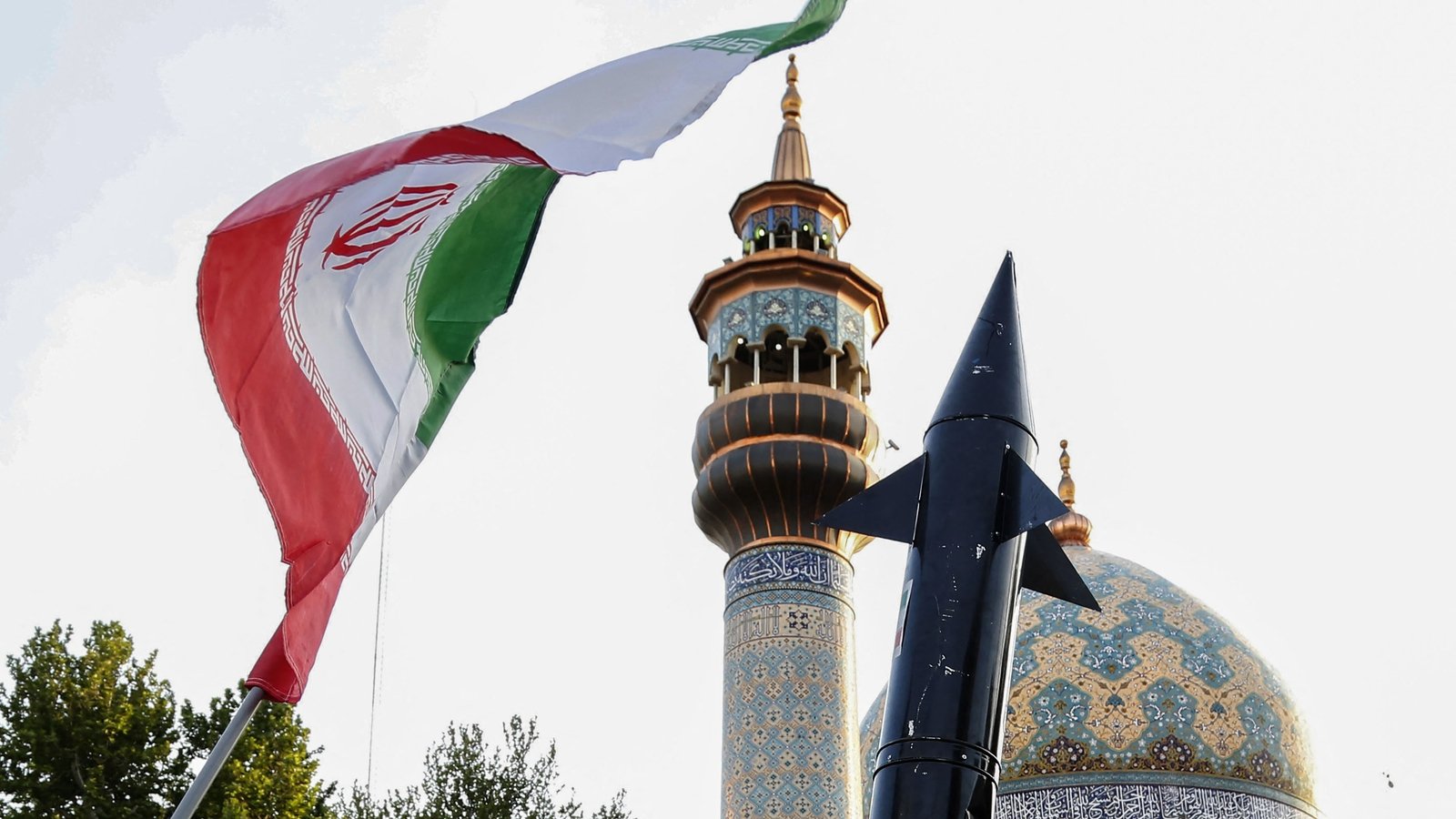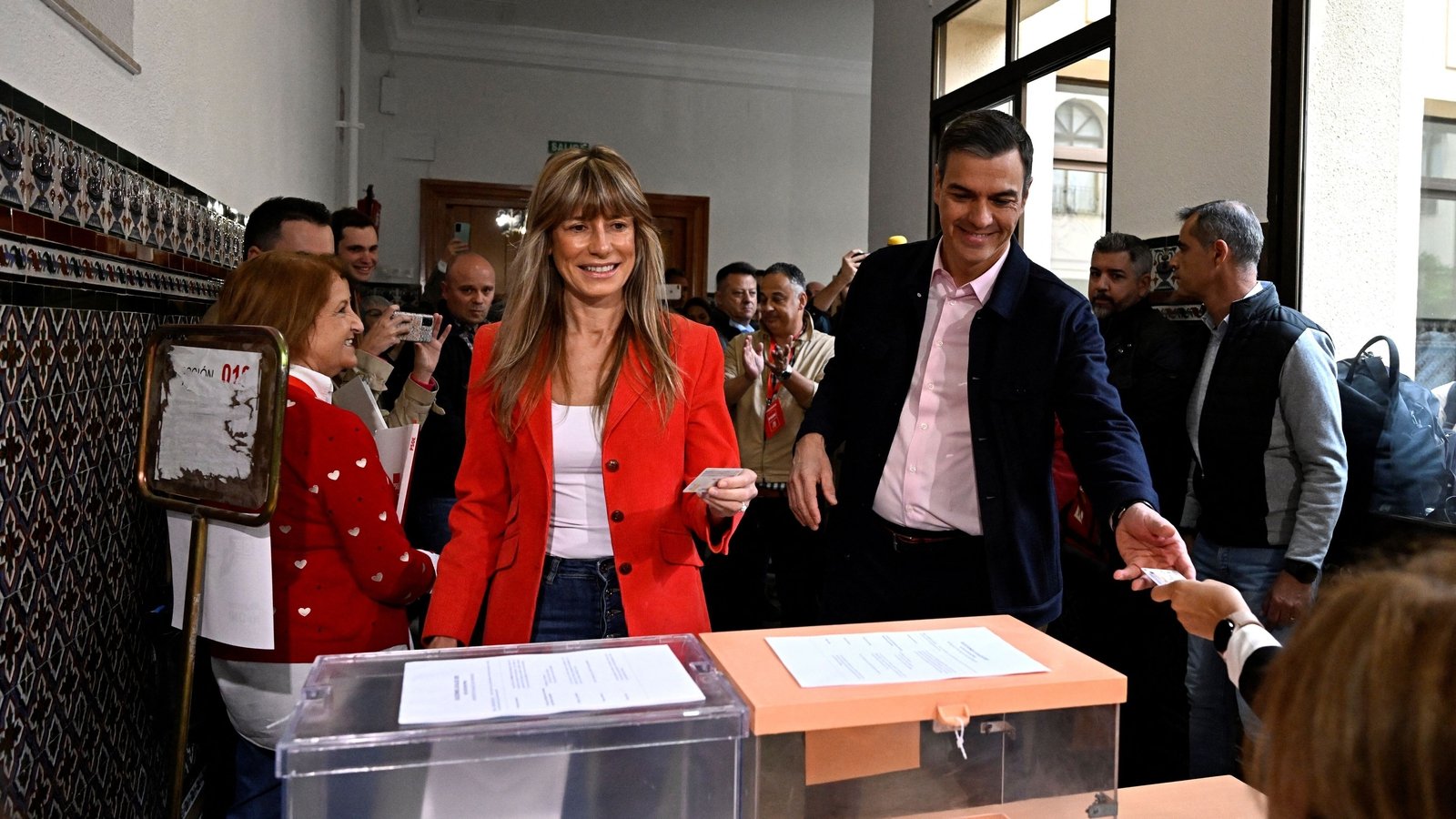On the cusp of making history
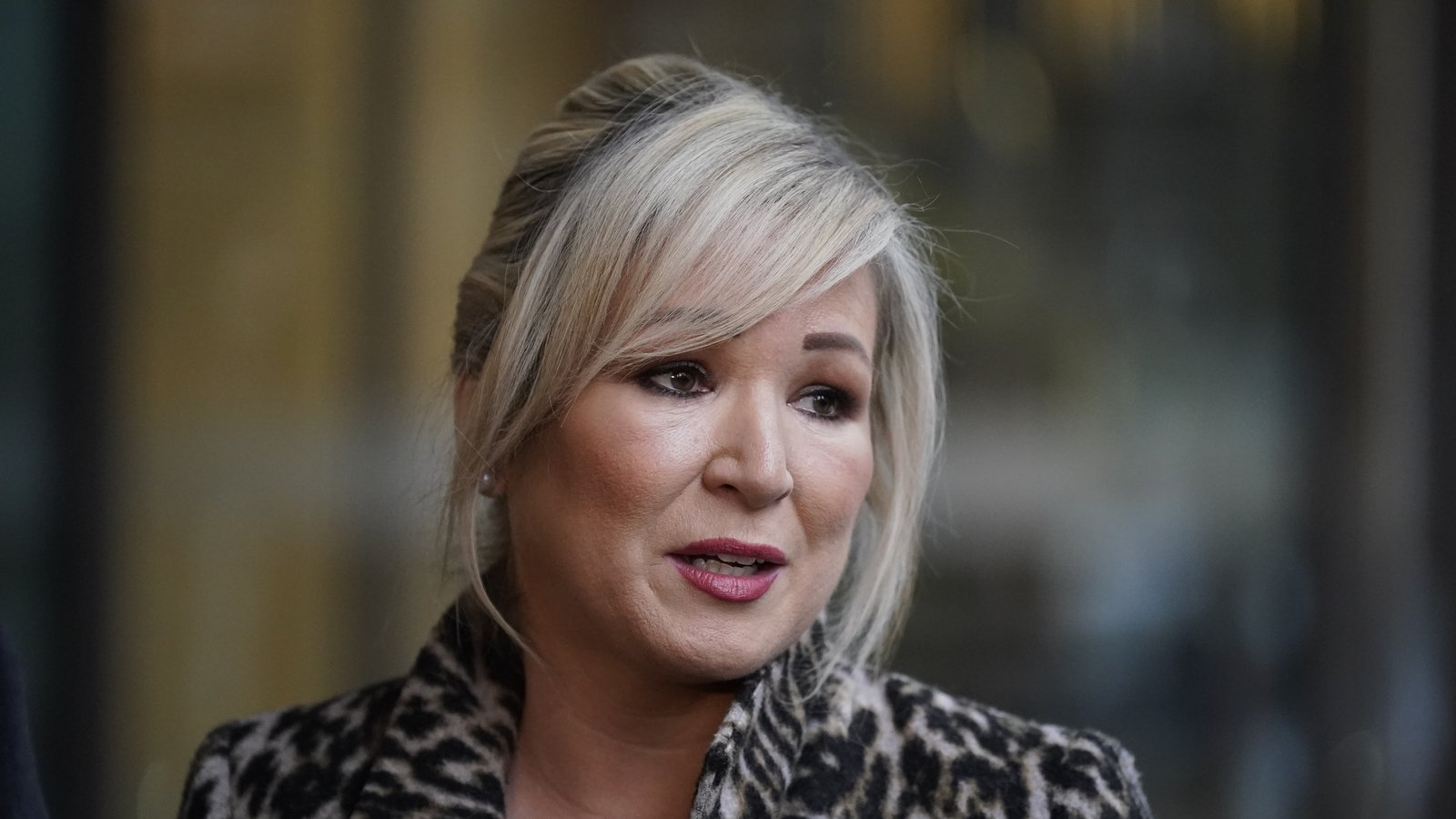
From a background steeped in republicanism, Michelle O’Neill has risen to the cusp of making history as Northern Ireland’s first nationalist First Minister.
Who is Michelle O’Neill?
Born Michelle Doris on 10 January 1977 in Fermoy, Co Cork, she was raised in the village of Clonoe in rural Co Tyrone where she still lives today.
She comes from a family of prominent Irish republicans. Her father, Brendan Doris, was a former Provisional IRA prisoner who later became a Sinn Féin councillor in Dungannon.
Her uncle, Paul Doris, was the president of Noraid, a republican fundraising group. Tony Doris, Ms O’Neill’s cousin, was one of three IRA members killed in an ambush by the British Special Air Service in 1991.
Ms O’Neill became a mother aged 16. She has spoken of the challenges of raising her daughter, Saoirse, in her Catholic community in the 1990s while still at school.
In a 2021 interview, she said: “Certainly I had some very, very negative experiences when I was pregnant. The school that I went to wasn’t particularly supportive at times. Certainly not all of them, but some in the school. I went to a Catholic grammar.
“You were nearly made to feel girls like you can’t be at school, that kind of a thing.”
She had her second child, Ryan, five years later.
How did she get into politics?
Coming from a background steeped in republicanism, Ms O’Neill was a teenager when the peace process began.
She joined Sinn Féin after the Good Friday Agreement in 1998 at the age of 21, working as an adviser to politician Francie Molloy in the Northern Ireland Assembly.
In 2005, she replaced her late father Brendan Doris on Dungannon Borough Council, later becoming the first woman to hold the post of mayor of Dungannon and South Tyrone in 2010. She was also one of the youngest people to hold this position.
Doing a bit of clearing out and came across my first ever election poster…2005 seems like a lifetime ago. So much has changed in 17 years pic.twitter.com/KL0Jzcpjpu
— Michelle O’Neill (@moneillsf) January 3, 2022She was first elected to the Stormont Assembly in 2007, alongside party veterans Martin McGuinness and Francie Molloy, as representatives for Mid Ulster.
Although seen as the face of a new generation of Sinn Féin, Ms O’Neill worked alongside Martin McGuinness, the IRA commander who became a cornerstone of Northern Ireland’s peace.
Mr Molloy, now the area’s MP, described her as someone who doesn’t rush into commentary on things, a good listener who sits back, observes, and takes account of things, and not a reactionary sort of person.
“She would certainly be more on the lines of consideration and looking at all the effects of it and looking at the good points of people as well as the issues.”
After four years on the back benches at Stormont as spokesperson for health and after sitting on the Education Committee, she was appointed Agriculture Minister in 2011.
Her rapid rise within the party continued when in 2015 she took on the higher profile and more challenging role of Health Minister. One of her first actions in this position was to lift the lifetime ban on gay men donating blood.
When did she become Sinn Féin leader in Northern Ireland?
In January 2017, Martin McGuinness resigned as deputy first minister in protest at the handling of a botched energy scheme, leading to the collapse of power-sharing and triggering a snap election.
Just 10 days later he announced he was quitting frontline politics to concentrate on recovering from a serious illness.
Before the month of January was out, Michelle O’Neill was unveiled as the new Stormont Sinn Féin leader marking a generational change at the top of the republican party.
Now, both Sinn Féin President Mary Lou McDonald and Ms O’Neill come from a generation of Irish republicanism which had no direct role in IRA activities, unlike previous leaders.
When was she elected Sinn Féin Vice President?
The post became vacant when Ms McDonald became the only candidate nominated to replace retiring party president Gerry Adams.
Ms O’Neill was the only candidate nominated for the Vice President role.
Both Ms O’Neill and Ms McDonald were formally confirmed in their new leadership roles at a special party conference in Dublin on 10 February 2018.
At the time she said that they were entering a new political era: “Sinn Féin wants to be in government North and South to deliver high quality public services on the basis of equality, rights and prosperity.
“We will continue to work against the twin threats of Brexit across the whole island, and British government austerity in the North.
“Our priority is to continue the growth and development of Sinn Féin as a national political movement for Irish unity and an agreed Ireland.”
In November 2019 she faced a leadership challenge from John O’Dowd winning with 67% of the vote.
Comhghairdeas to Michelle on being elected Leas Uachtáran Sinn Féin. I look forward to working with you in the time ahead. Go raibh maith agaibh to all those who supported me over this last number of weeks & those who voted for me.
— John O’ Dowd (@JohnODowdSF) November 16, 2019
She then led her party’s team in the talks process which led to the restoration of Stormont in 2020.
From Deputy First Minister to First Minister
In January 2020, Ms O’Neill was appointed deputy first minister of Northern Ireland, just months before the Covid pandemic struck.
At the start of the pandemic, DUP first minister Arlene Foster and deputy first minister Michelle O’Neill said they were united in ending the crisis saying unionists and nationalists could work together.
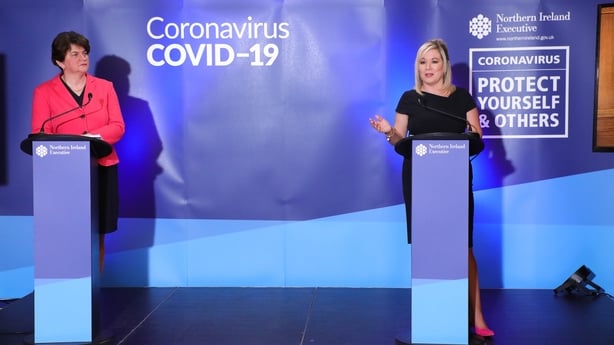
The power-sharing executive was to be in place for just two years before the DUP collapsed it again over Post-Brexit trading arrangements.
Ms O’Neill automatically lost her position in June 2021 when Arlene Foster resigned as first minister, and regained it three days later when she and Paul Givan were nominated as deputy first minister and first minister respectively.
In February 2022, O’Neill once again lost her position as deputy first minister with the resignation of Mr Givan as first minister.
Following elections in May 2022, with Ms O’Neill at the forefront, Sinn Féin made history when it won 27 seats compared with the DUP’s 25, making it the biggest political party in the Northern Ireland Assembly.
The assembly leader of the largest party becomes the first minister.
But for the past two years, power-sharing was suspended after the DUP walked out in protest over a post-Brexit trade deal with the European Union.
This week, leader Jeffrey Donaldson and his DUP agreed to restore power-sharing after changes were agreed to post-Brexit trading arrangements. Thus, also giving the green list for Ms O’Neill to take up her role as first minister alongside a DUP deputy first minister.
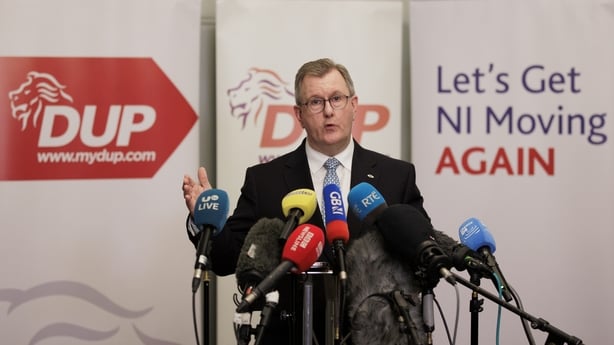
The first and deputy first ministers are joint offices and both hold equal power, one of them cannot make any decisions without the agreement of the other.
But Michelle O’Neill becoming the first-ever republican first minister of Northern Ireland will mark a symbolic moment.
When MLAs gather at Stormont today, she will finally be nominated to the position she became entitled to by leading Sinn Féin to victory in the 2022 Assembly elections.
Can she be a First Minister for all?
In 2020, she faced calls to resign as deputy first minister after attending the funeral of republican Bobby Storey in Belfast in 2020 at a time when strict limits on such events were in place due to the pandemic.
In 2022, O’Neill said in an interview there was “no alternative” to the IRA’s armed campaign during the Troubles.
She said: “I don’t think any Irish person ever woke up one morning and thought that conflict was a good idea, but the war came to Ireland. I think at the time there was no alternative, but now, thankfully, we have an alternative to conflict and that’s the Good Friday Agreement.”
However, Ms O’Neill has also broken new ground for republicans, showing warmth and respect through her attendance at the funeral of the late British Queen Elizabeth in 2022 and the coronation of King Charles last year.
She said: “We live in changing times and it was the respectful thing to do, to show respect and to be here for all those people at home, who I had said I would be a first minister for all.”
She has consistently said she wants to be a first minister for all determined to “lead an Executive as a First Minister for all, and to build a better future for all our people and communities”.
When devolved government returns today, Ms O’Neill and her new team of ministerial colleagues will be tasked with dealing with a budget crisis and crumbling public services.
With a relaxed manner but a strong determination, her job now is to develop good relations with the new Deputy First Minister and help make power-sharing work again.
Additional reporting: PA


